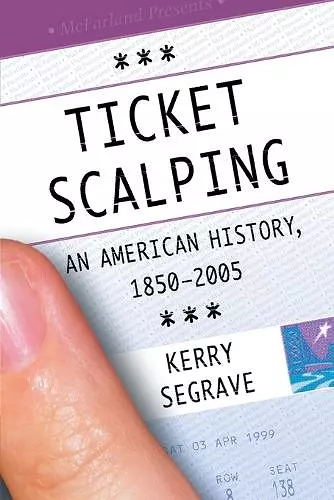Ticket Scalping
An American History, 1850-2005
Format:Paperback
Publisher:McFarland & Co Inc
Published:15th Nov '06
Currently unavailable, and unfortunately no date known when it will be back

Ticket scalping is as much an American staple as apple pie. Beginning as early as the mid-1800s, scalpers, known as "sidewalk men," were charging all the traffic would bear for event tickets. Although these speculators were generally viewed as pariahs and public opinion was against the practice, legal attempts to limit their activities were far from successful. Boston enacted laws as early as 1873, while Pennsylvania followed suit in 1884. Still, such measures did little good since some laws were declared unconstitutional and, for the ones that were upheld, the fines were negligible with jail time rarely served. Over the years, as moral objections to scalping dimmed, the public became more tolerant as the practice became increasingly prevalent. By the 1990s, the capitalist mantras of free market and economic principles of supply and demand were even being used to justify the practice.
This volume details the ways in which scalping has changed over the years from a one-man business to an agency-controlled enterprise, from performances by Jenny Lind to Billy Joel. The book examines the general situation, public opinion and legal perception of scalping for four distinct periods: 1850-1899; 1900-1917; 1918-1949 and 1950-2005. Emphasis is placed on the ways in which public and legal perception of the practice has evolved over this period. Scalping, slowly gaining a more positive status, has become more accepted as part of the economic practice of free markets.
ISBN: 9780786428052
Dimensions: 229mm x 152mm x 14mm
Weight: 376g
268 pages